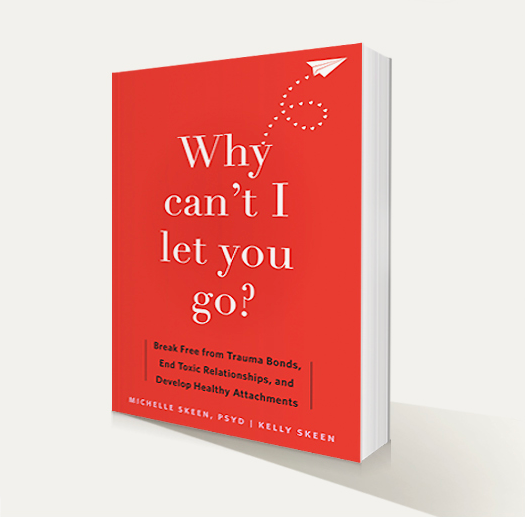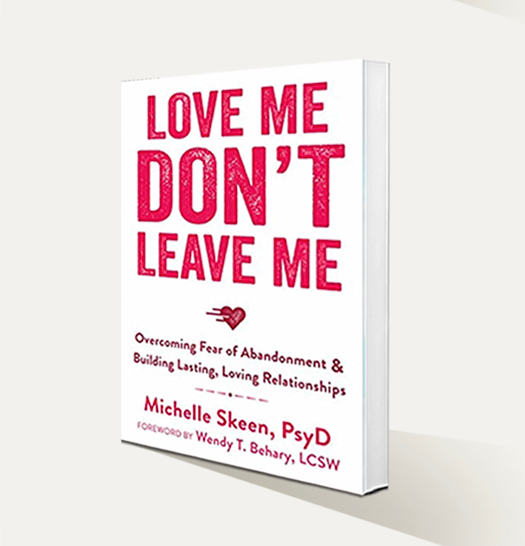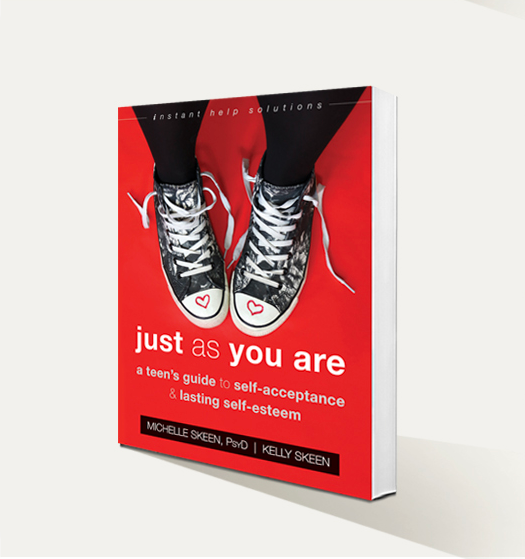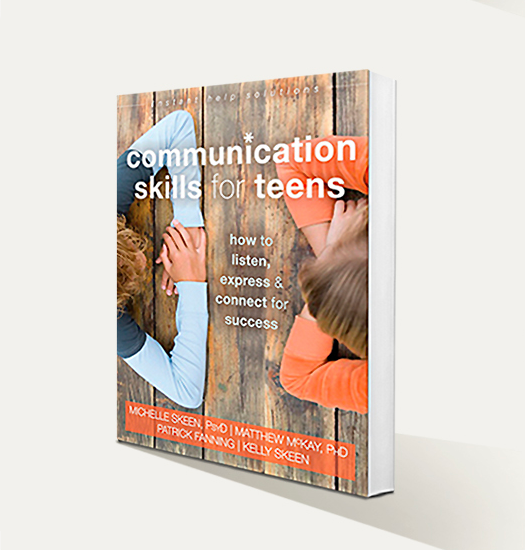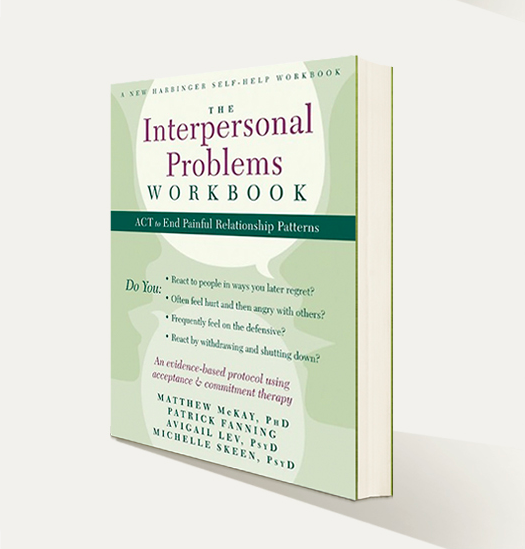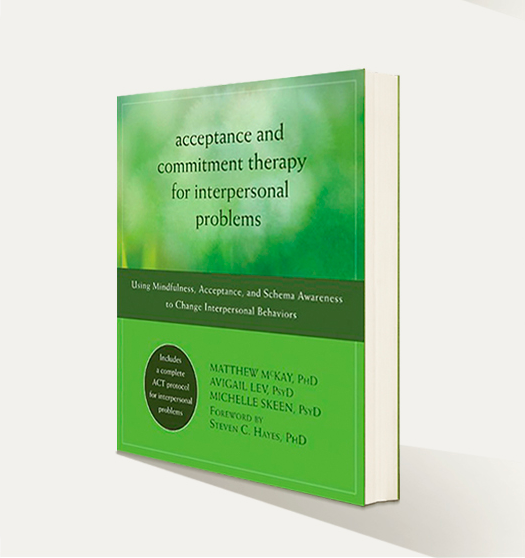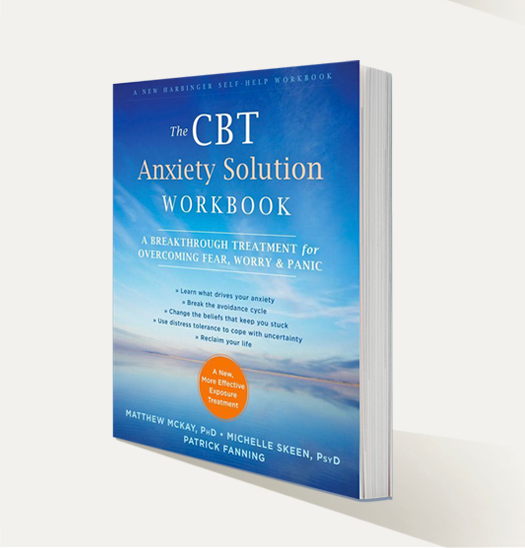Does Social Media Feed Your Feelings of Unworthiness?
 By Kelly Skeen and Michelle Skeen, PsyD, authors of Just As You Are
By Kelly Skeen and Michelle Skeen, PsyD, authors of Just As You Are
How many times have you looked at your phone today? 10? 20? 30? 40? If you’re an average tween or teen you’ve looked at your phone 46 times. And, you’ve spent a third of your day using media—Instagram, Facebook, online videos, and music. Maybe you do it without thinking.
Have you ever thought about how all of these images are impacting your beliefs about yourself and others? It’s likely that, knowingly or unknowingly, you are comparing yourself to the images you see on your feeds every day. All of us struggle with some aspect of ourselves. This feeling is reinforced and likely made worse by social media and the constant and ever-changing messages you receive about what you need to do, to look like, and to act like in order to be accepted. It can leave you feeling like you need to hide parts of yourself that aren’t perfect and/or don’t fit within the norm. This by itself feels like a setup for failure.
As you might imagine, your beliefs about yourself are a mixed bag. You probably hold some beliefs about yourself that are positive. Maybe you make friends easily, you have great hair, you are close with your siblings, you excel academically, you’re good at sports, and so on. But you also likely have beliefs about yourself that are negative. In fact, this might mean that you are hiding parts of yourself because you fear being judged, not accepted, or both. You may feel that you are outside of the norm in some way. There might even be aspects of your identity that you have no control over or you don’t like—such as your ethnicity, religion, family, culture, height, eye color, body type…you get the point.
Of course, there is even more of your life that is out of your control, because you have parental figures who control parts of your life that you have little or no say about—where you live, what school you attend, activities you are or are not allowed to participate in, who you can be friends with, who you can date—the list goes on. There’s a good chance that you feel inadequate, flawed, or not good enough as a result of some of these factors.
Every teenager (even the ones that seem perfect!) struggles with feelings of inadequacy, defectiveness, and unworthiness. This impacts your feelings of self-worth, which might be holding you back or getting in the way of satisfying peer interactions and acceptance. Like most people, you care what other people think of you, and you probably spend at least some time comparing yourself to your peers. Social media feeds our natural tendency to compare how we measure up to others. This can result in feeling that you are flawed—not as perfect as other people might seem. When these feelings get repeatedly reinforced over time, it can lead to shame, depression, anxiety, and isolation.
We are all wired to connect with others, and when we do make healthy connections, we thrive. So it makes sense that we would want to be accepted by others, and we would fear being found not good enough and rejected. In fact, you may go to great lengths to avoid judgment or rejection from others. This might include seeking affirmation from others, being unable or unwilling to make decisions without approval from others, or having difficulty hearing even mild criticism.
You may find it difficult to accept and share parts of yourself that are out of your control, or you may feel like you need to be a certain way to be liked and accepted by others. Or you may focus more of your energy on others to distract them from the ways in which you feel insufficient. You may already be thinking about the parts of yourself that make you feel less than, or that you hide from others because you fear the response you might receive. And you might even be aware of the ways this holds you back from realizing your full potential or building the relationships that you long for.
The truth is that you don’t have to keep hiding from others or comparing yourself to others. You are beautiful and perfect just as you are.
Lifelong struggles with feelings of unworthiness and inferiority begin with beliefs formed when we’re teenagers. Just As You Are empowers teens to identify and eliminate these beliefs now, before they take root and cause problems like depression, addiction, and failed relationships in adulthood.
https://www.newharbinger.com/blog/does-social-media-feed-your-feelings-unworthiness
My radio show on Thursday July 12, 2018
This week on Relationships 2.0 my guest is Karen Bluth, PhD author of The Self-Compassion Workbook for Teens: Mindfulness & Compassion Skills to Overcome Self-Criticism & Embrace Who You Are
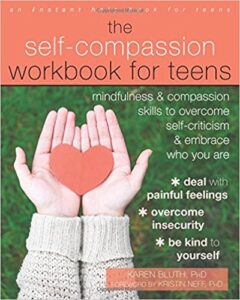 About the book:
About the book:
Your teen years are a time of change, growth, and—all too often—psychological struggle. To make matters worse, you are often your own worst critic. The Self-Compassion Workbook for Teens offers valuable tools based in mindfulness and self-compassion to help you overcome self-judgment and self-criticism, cultivate compassion toward yourself and others, and embrace who you really are.
As a teen, you’re going through major changes—both physically and mentally. These changes can have a dramatic effect on how you perceive, understand, and interpret the world around you, leaving you feeling stressed and anxious. Additionally, you may also find yourself comparing yourself to others—whether its friends, classmates, or celebrities and models. And all of this comparison can leave you feeling like you just aren’t enough. So, how can you move past feelings of stress and insecurity and start living the life you really want?
Written by psychologist Karen Bluth and based on practices adapted from Kristin Neff and Christopher Germer’s Mindful Self-Compassion program, this workbook offers fun and tactile exercises grounded in mindfulness and self-compassion to help you cope more effectively with the ongoing challenges of day-to-day life. You’ll learn how to be present with difficult emotions, and respond to these emotions with greater kindness and self-care. By practicing these activities and meditations, you’ll learn specific tools to help you navigate the emotional ups and downs of the teen years with greater ease.
Life is imperfect—and so are we. But if you’re ready to move past self-criticism and self-judgment and embrace your unique self, this compassionate guide will light the way.
About the author:
Karen Bluth, PhD, earned her doctoral degree in child and family studies at the University of Tennessee. She is currently research faculty in the Program on Integrative Medicine in the Department of Physical Medicine and Rehabilitation at the University of North Carolina School of Medicine. Her work focuses on the roles that mindfulness and self-compassion play in promoting well-being in teens. Bluth was awarded a Francisco J. Varela research award from the Mind and Life Institute in 2012, which allowed her to explore the effects of a mindfulness intervention on adolescents’ well-being through examining stress biomarkers. In spring 2015, she received internal University of North Carolina funding to explore relationships among mindfulness, self-compassion, and emotional well-being in teens in grades 7–12. With current NIH funding, she is part of a research team at the University of North Carolina that is studying the teen adaptation of Kristin Neff and Christopher Germer’s Mindful Self-Compassion program.
In addition to her research, Bluth regularly teaches mindfulness and mindful self-compassion courses to both adults and teens in the Chapel Hill, NC, area and regularly gives talks and leads workshops at schools and universities. In collaboration with Lorraine Hobbs, Bluth has adapted Kristin Neff and Christopher Germer’s Mindful Self-Compassion program for an adolescent population. A former educator with eighteen years classroom experience, Bluth is currently associate editor of the academic journal Mindfulness.
My radio show on Thursday January 18, 2018
This week on Relationships 2.0 my guest is Jeffrey Bernstein, PhD author of Mindfulness for Teen Worry: Quick & Easy Strategies to Let Go of Anxiety, Worry & Stress
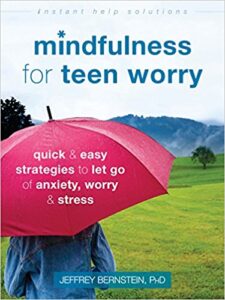 About the book:
About the book:
Is your worrying keeping you from reaching your goals? In Mindfulness for Teen Worry, a clinical psychologist offers quick, easy-to-learn mindfulness skills teens can use anytime, anywhere to stop worries from growing and taking over.
Let’s face it—being a teen isn’t easy. And if you’re like a lot of other teens, you probably worry about getting good grades, fitting in with a certain crowd, or what the future will bring after high school. These are all completely normal worries, and signs that you are tuned in to your life and thinking about your goals. But what about chronic worrying—the kind that keeps you up at night, ruminating about that paper you just turned in, or that thing your friend said to you at lunch (what did she mean by that?), and so on. Sometimes worrying isn’t helpful. In fact, it can get in the way of living your life! So, how can you start putting worry in its place before it takes up too much head space?
Mindfulness for Teen Worry will show you how living in the moment will dissolve worry and help you stay grounded in the here and now. You’ll learn powerful and easy-to-use mindfulness skills to manage the four most common worry struggles teens face: school pressure, coping with friendship and relationship problems, improving body image, and handling family conflicts. You’ll discover why you worry and the long-term destructive impacts worry can have on your life. And most importantly, you’ll be introduced to simple, effective techniques to help you become more mindful—like harnessing the power of the breath and how to relax your body in times of stress.
If you struggle with worry or anxiety that gets in the way of being your best, this fun and friendly guide will help you maintain a mindful life in a frenzied world.
About the author:
Jeffrey Bernstein, PhD, is a psychologist with over thirty years’ experience specializing in child, adolescent, couples, and family therapy. He holds a PhD in counseling psychology from the University at Albany, State University of New York, and completed his postdoctoral internship at the Center for Counseling and Psychological Services at the University of Pennsylvania. He has served as an expert advisor for The Today Show, Court TV, CBS Eyewitness News, NBC 10 – Philadelphia, and appeared on National Public Radio. He has authored five books, including 10 Days to a Less Defiant Child, 10 Days to Less Distracted Child, Liking the Child You Love, Why Can’t You Read My Mind?, and Letting Go of Anger, a card deck for teens.
How to Talk to Anyone
As Seen In
Article related to Communication Skills for Teens:
How to Talk to Anyone
Choices
by Andrea Bartz
click to enlarge:
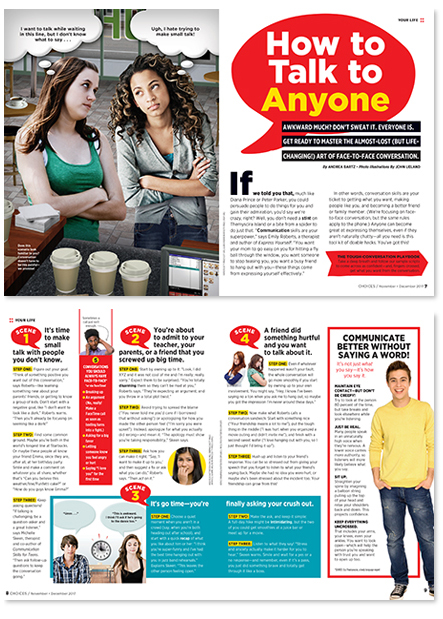
My daughter and I have a new book coming out June 2018
Just As You Are: A Teen’s Guide to Self-Acceptance & Lasting Self-Esteem, co-authored with my daughter, Kelly Skeen
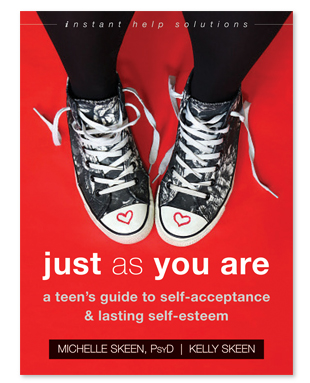
My radio show on Thursday January 5, 2017
This week on Relationships 2.0 my guest is Holly B. Rogers, MD author of The Mindful Twenty-Something: Life Skills to Handle Stress…& Everything Else
While my daughter (and co-author of Communication Skills for Teens) was home from college, we had the opportunity to chat with Holly about her new book.
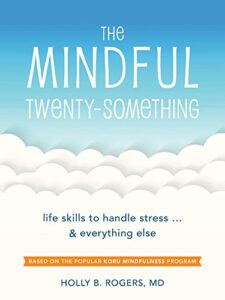 About the book:
About the book:
In The Mindful Twenty-Something, the cofounder of the extremely popular Koru Mindfulness program developed at Duke University presents a unique, evidence-based approach to help you make important life decisions with clarity and confidence.
As a twenty-something, you may feel like you are being pulled in dozen different directions. With the daily tumult, busyness, and major life changes you experience as a young adult, you may also be particularly vulnerable to stress and its negative effects. Emerging adulthood, which occurs between the ages of 18 and 29, is a developmental stage of life when you’re faced with important decisions about school, relationships, sex, your career, and more. With so much going on, you need a guide to help you navigate with less stress and more ease.
The Koru Mindfulness program, developed at Duke University and already in use on numerous college campuses—including Harvard, Yale, Princeton, MIT, Dartmouth, and several others—and in treatment centers across the country, is the only evidence-based mindfulness training program for young adults that has been empirically proven to have significant benefits for sleep, perceived stress, and self-compassion. Now, with The Mindful Twenty-Something, this popular program is accessible to all young adults struggling with stress.
With Koru Mindfulness and the practical tools you’ll learn from this acceptance-based, proven-effective approach, you’ll be able to cultivate the compassion and mindfulness skills you need to manage life’s challenges from a calm, balanced center, regardless of what comes your way.
About the author:
Holly Rogers, M.D. is one of the developers of Koru, an evidence-based program for teaching mindfulness and meditation to college-age adults. Holly works as a psychiatrist at the student counseling center at Duke University where she helps students integrate the practice of mindfulness into their lives in a meaningful way. She is a clinical associate in the department of psychiatry at Duke University Medical Center. She is the co-author with Margaret Mayan of Mindfulness for the Next Generation: Helping Emerging Adults Manage Stress and Lead Healthier Lives. Her latest book, The Mindful Twenty-Something, is a guide for young adults who wish to learn about using mindfulness and meditation to enhance their journey through emerging adulthood.
My Radio Show on Thursday August 18, 2016
This week on Relationships 2.0 my guest is Kelly Skeen co-author of Communication Skills for Teens: How to Listen, Express and Connect for Success. As teens head back to school, we think it’s a good time to revisit and reinforce healthy communication skills.
The framed needlepoint in the photo was a birthday gift to Kelly from her amazingly thoughtful and creative friend, Ari, who ordered it on Etsy. It was made by a woman in Belgium!

About the book:
Communication is an essential life skill that every teen must learn. Based on the New Harbinger classic, Messages, this book will teach you the necessary skills—such as assertiveness, active listening, and compassion—to become an effective communicator for life.
In an age of social media, texting, and ever-evolving technology, it’s easy to forget how to engage in real, face-to-face communication, a critical skill for your future success! As you become more connected to your smartphone and the internet, your ability to connect in person may diminish. But technology doesn’t replace the need for effective communication skills. In fact, successful personal and professional relationships are dependent upon connecting with people face-to-face.
Communication Skills for Teens provides the guidance you need to become a better communicator and succeed in all areas of life. You’ll also learn tons of essential life skills, including active listening, assertiveness, clarifying language, the art of an apology, compassion, interviewing skills, family communication, and more. Each chapter focuses on one key aspect of communication, offers a real teen’s perspective, and includes practical exercises to help you apply what you’ve learned in the real world—away from your computer and smartphone screens.
By following the practical, skills-based tips in each chapter of this book, you’ll learn powerful communication techniques to last a lifetime.
About the co-author:
Kelly Skeen is an undergraduate student at Georgetown University, majoring in American Studies and minoring in Spanish and Education, Inquiry & Justice.
Save
Save
 By Kelly Skeen and Michelle Skeen, PsyD, authors of Just As You Are
By Kelly Skeen and Michelle Skeen, PsyD, authors of Just As You Are







